Are you tired of dealing with waste piling up around your home or business? Well, fear not! We’ve got everything you need to know about the different types of dumpsters for rent. Whether you’re a homeowner looking to declutter or a business owner needing efficient waste management solutions, we’ve got your back. From residential roll-off dumpsters to commercial compactor dumpsters, we’ll guide you through the ins and outs of each option. So buckle up and get ready for a cleaner, safer environment!
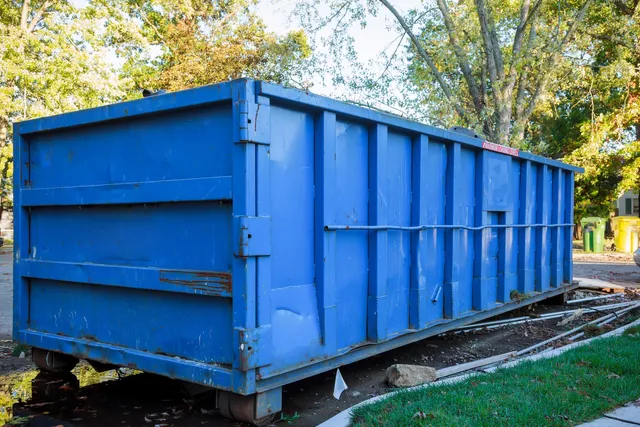
The Basics of Dumpster Rental
When it comes to managing waste and debris, renting the right size and type of dumpster is crucial. A dumpster is a large container designed to hold and transport various types of waste materials. By renting the appropriate size and type of dumpster, you can ensure that your waste disposal needs are met effectively while minimizing costs and maximizing efficiency.
What is a dumpster and its purpose
A dumpster is a large waste container that’s commonly used for construction projects and other types of clean-up. It provides a safe and efficient way to dispose of various types of waste, including construction debris, household junk, and yard waste. Renting a dumpster for waste management offers several benefits, such as easy access to disposal options, cost-effectiveness compared to other methods, and ensuring compliance with local regulations for proper waste disposal.
Importance of renting the right size and type of dumpster
To ensure you have enough space for all your waste, it’s crucial to rent the appropriate size and type of dumpster. The importance of proper disposal methods cannot be emphasized enough. By choosing the right dumpster, you can ensure that your waste is handled safely and efficiently, reducing the risk of accidents or environmental harm. Additionally, considering cost factors such as rental fees and potential overweight charges will help you stay within budget while maintaining a responsible waste management approach.
Residential Dumpsters
If you’re looking for a convenient way to dispose of your household waste, consider renting a residential dumpster. Residential waste management is crucial for maintaining a clean and safe living environment. By using the proper disposal methods, you can effectively manage your waste while promoting safety. Renting a residential dumpster allows you to easily dispose of various types of waste, including construction debris, furniture, appliances, and more. Ensure you follow all guidelines and regulations to prevent any hazards or environmental damage.
Roll-off Dumpsters
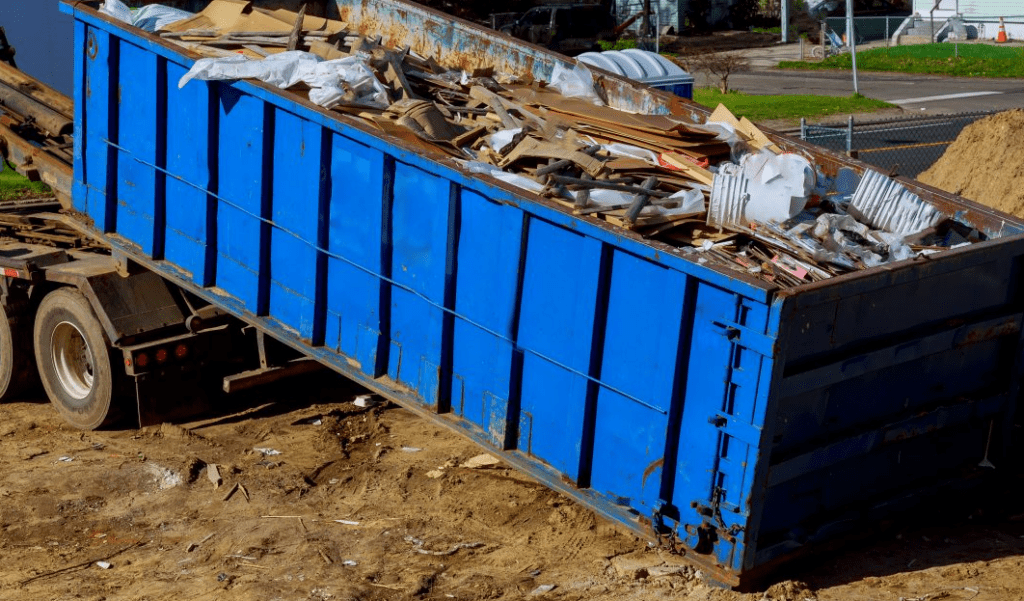
Roll-off dumpsters are large, rectangular waste containers that are typically used for construction and demolition projects. They are transported to the site by specialized trucks equipped with hydraulic systems that allow them to be rolled off and onto the ground. These dumpsters have a capacity ranging from 10 to 40 cubic yards, making them ideal for handling large amounts of debris. The main advantage of roll-off dumpsters is their versatility and convenience in handling heavy or bulky materials, as they can be easily loaded using equipment like loaders or cranes. However, their size and weight can also be a drawback, requiring sufficient space for placement and potentially causing damage to driveways or other surfaces if not properly supported during use.
Pros and cons
When considering renting a dumpster, it’s important to weigh the pros and cons. There are several factors to consider when renting a dumpster. On the positive side, renting a dumpster can provide convenient waste disposal for large projects and help maintain cleanliness and safety on your property. However, there are also potential drawbacks such as cost, restrictions on what can be disposed of, and the need for sufficient space to accommodate the dumpster.
Front Load Dumpsters
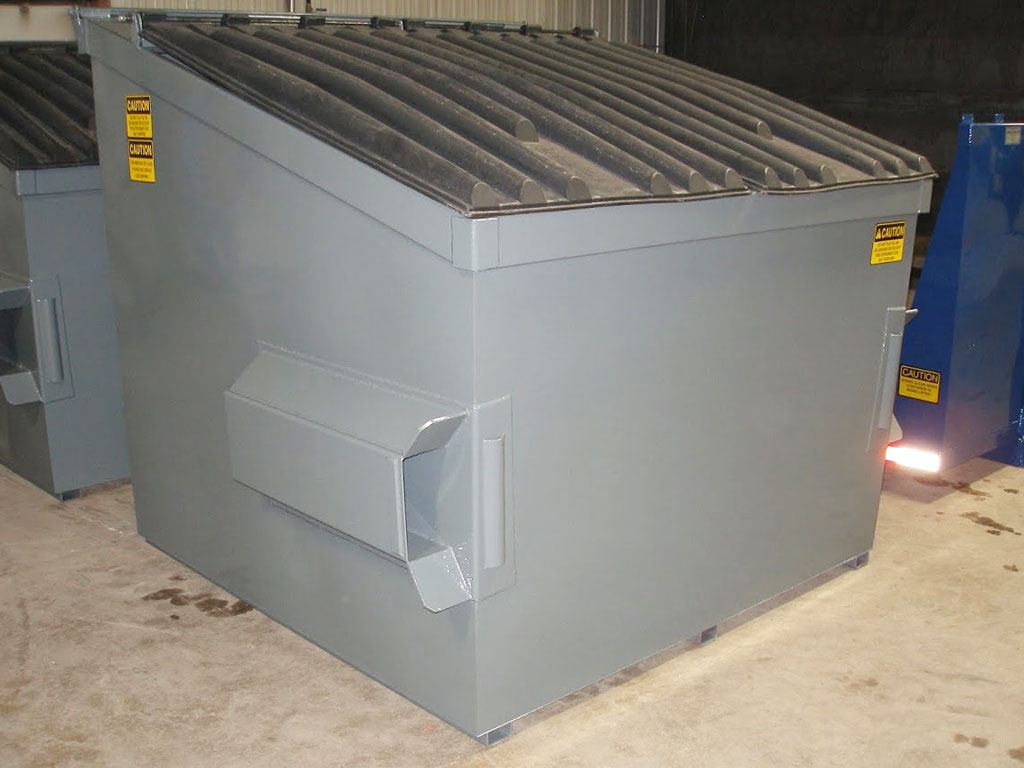
Front load dumpsters, also known as front-end containers, are large waste receptacles typically used in commercial and industrial settings. These dumpsters are designed to be emptied by specialized trucks equipped with hydraulic arms that lift and empty the contents into the truck’s compactor. The typical usage of front load dumpsters includes regular collection of general waste or recyclables from businesses and multi-unit residential buildings.
Typical sizes range from 10 to 40 cubic yards, with larger ones available for commercial use. Rental prices vary depending on size and duration, usually starting around $300 per week. Make sure to follow all safety guidelines when loading and unloading the dumpster to prevent accidents.
Pros and cons
Some pros of using front load dumpsters include their ability to handle heavy loads, their compact size that makes them suitable for urban areas with limited space, and their secure lids that prevent unauthorized access. However, some cons to consider are the higher cost compared to other types of dumpsters, the need for ongoing pickup services due to smaller capacities, and potential odor issues if not properly maintained.
Rear Load Dumpsters
Rear load dumpsters are a type of waste container that is designed to be loaded from the back, hence their name. They are commonly used in commercial and industrial settings, such as restaurants, retail stores, and manufacturing facilities, where there is a need for regular waste disposal.
Pros and cons
One of the main advantages of rear load dumpsters is their convenience and ease of use, as they can be easily accessed by a garbage truck from the back. However, one drawback is that they have a smaller capacity compared to other types of dumpsters, which may require more frequent pickups for businesses with high waste volumes.
Construction Dumpsters
Construction dumpsters are a popular choice for contractors and builders to dispose of large amounts of debris. They offer convenience and efficiency in managing construction waste. Here are the benefits of recycling construction waste using construction dumpsters:
- Proper waste management:
- Construction dumpsters help ensure that construction waste is properly contained, reducing the risk of accidents and injuries.
- Recycling construction waste helps minimize the environmental impact by diverting materials from landfills.
Concrete Dumpsters
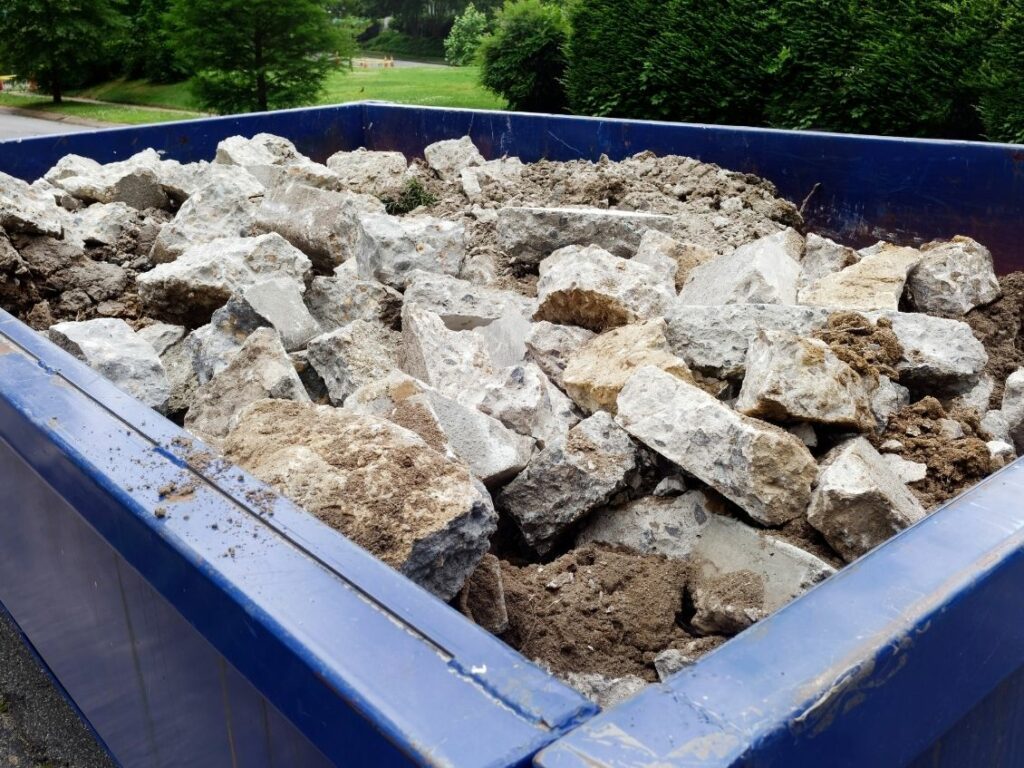
Concrete dumpsters are specifically designed for the disposal of concrete and other heavy construction materials. They are typically used in construction sites or during demolition projects where large amounts of concrete waste need to be removed. These dumpsters have a reinforced structure and strong capacity to handle the weight and volume of concrete debris.
When it comes to materials allowed, concrete dumpsters accept various forms of concrete waste, including broken pieces, slabs, blocks, and even wet or dry mixtures. However, it’s important to note that these dumpsters should only be used for disposing of concrete-related materials and not for general waste items such as household garbage or hazardous substances. Non-concrete items like wood, metals, plastics, or organic waste are not permitted in these specialized containers.
Materials allowed and not allowed
To ensure you comply with regulations, it’s important to be aware of the materials that are allowed and not allowed in a dumpster. When it comes to materials recycling, most dumpsters accept common items like cardboard, paper, plastics, and metal. However, hazardous waste disposal is strictly prohibited. This includes chemicals, paint cans, batteries, and medical waste. It’s crucial to properly dispose of these materials to prevent harm to the environment and ensure everyone’s safety.
Heavy Debris Dumpsters
When it comes to heavy debris disposal, these dumpsters are specifically designed to handle and transport large and weighty materials such as concrete, bricks, asphalt, rocks, and dirt. Commonly referred to as construction or demolition debris, these types of waste are often generated from renovation or building projects where there is a substantial amount of heavy material that needs to be removed efficiently.
Types of debris commonly disposed of
If you’re renovating your home, there’s a good chance that you’ll be disposing of materials such as drywall, flooring, and old fixtures. These dumpsters can handle heavy loads and provide easy access for loading and unloading.
Specialized Dumpsters
You can choose from a variety of specialized dumpsters for your specific waste disposal needs. Specialized dumpsters offer numerous benefits that can enhance safety and efficiency in waste management. Here are two types of specialized dumpsters to consider:
- Compactor Dumpsters:
- Reduce the volume of waste by compressing it, allowing for more efficient storage.
- Minimize the risk of overflowing or spillage, promoting a safer environment.
- Hazardous Waste Dumpsters:
- Designed to handle hazardous materials safely, preventing contamination and potential harm.
- Equipped with proper seals and features to meet regulatory requirements and ensure safe disposal.
Yard Waste Dumpsters
When it comes to gardening projects, a yard waste dumpster can be an ideal solution for disposing of various materials. These dumpsters are specifically designed to handle organic waste such as grass clippings, leaves, branches, and other garden debris. However, it is important to note that certain materials like chemicals, paints, and plastics cannot be disposed of in yard waste dumpsters due to environmental regulations.
Ideal for gardening projects
- Easy disposal of large quantities of yard waste
- Allows for efficient removal of branches, leaves, and grass clippings
- Minimizes the risk of injury from sharp objects or heavy loads
Recycling Dumpsters
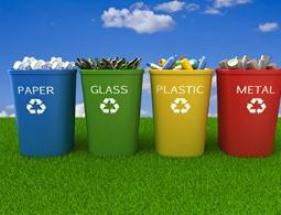
When it comes to recycling dumpsters, you may be wondering what exactly they are and how they can benefit the environment. Recycling dumpsters are specially designed containers that are used to collect and transport recyclable materials for processing and reuse. By utilizing these dumpsters, you can help reduce waste going into landfills and contribute to a more sustainable future. Accepted recyclable materials typically include paper, cardboard, glass, plastic bottles, aluminum cans, and certain types of metal. Properly sorting and disposing of these items in recycling dumpsters not only helps conserve resources but also reduces pollution and energy consumption associated with manufacturing new products from raw materials.
Accepted recyclable materials
Accepted recyclable materials can include paper, plastic, glass, and aluminum. Recycling these materials has numerous benefits for both the environment and your safety. By recycling paper, you reduce the need for cutting down trees and contribute to cleaner air quality. Plastic recycling helps conserve energy and reduces pollution caused by plastic production. Glass recycling saves natural resources and decreases landfill waste. Aluminum recycling saves energy and reduces greenhouse gas emissions. Start recycling today to protect the environment and ensure a safer future for all.
Hazardous Waste Dumpsters
When it comes to hazardous waste dumpsters, it is essential to understand the definition and proper handling of special waste. Special waste refers to materials that can pose a threat to human health or the environment if not disposed of correctly. In order to ensure safety, it is crucial to follow specific safety measures when dealing with these dumpsters, such as wearing protective gear and using appropriate disposal techniques. Additionally, there are certain prohibited materials that should never be placed in hazardous waste dumpsters, including explosives, flammable liquids, and radioactive substances.
Safety measures and prohibited materials
Prohibited materials, like flammable substances and radioactive waste, pose serious safety risks. It is crucial to never dispose of them in dumpsters. To ensure safety, follow proper disposal methods and recycling guidelines. Flammable substances can cause fires and explosions when mixed with other waste or exposed to heat sources. Radioactive waste can contaminate the environment and harm human health if not handled correctly. Always prioritize safety by using appropriate disposal methods for these materials.
Commercial Dumpsters
If you’re running a business, you’ll want to consider renting a commercial dumpster to efficiently manage your waste. Commercial waste disposal can be a complex process, but with the right dumpster rental, you can simplify things. Here are some key points to know:
- Types of commercial dumpsters:
- Front-load dumpsters: Ideal for daily waste collection in small businesses.
- Roll-off dumpsters: Perfect for large-scale construction projects or renovations.
- Factors affecting dumpster rental costs:
- Size of the dumpster required.
- Duration of the rental period.
- Location and accessibility of the site.
Compactor Dumpsters
Compactor dumpsters are a type of waste management solution commonly used by businesses to efficiently handle large volumes of waste. These dumpsters are equipped with compacting mechanisms that compress the waste, allowing for more efficient use of space and reducing the frequency of emptying. There are various types and configurations available, including stationary compactors which are permanently installed on-site, and self-contained compactors which have an integrated container.
Various types and configurations
The various types and configurations of dumpsters offer businesses a wide range of options for their waste management needs. When choosing a dumpster, there are several factors to consider. One important factor is the size of the dumpster. Dumpster sizes vary from small to large, depending on the amount of waste you generate. Other factors include accessibility, weight restrictions, and type of waste allowed. Carefully considering these factors will ensure safe and efficient waste disposal for your business.
Restaurant Dumpsters
When it comes to restaurant dumpsters, special attention is given to their design in order to meet the unique needs of food establishments. These dumpsters are equipped with features such as sealed lids and odor control systems to ensure proper sanitation and hygiene. In terms of usage and maintenance, it is crucial for restaurant owners to follow a regular cleaning schedule, dispose of waste properly, and conduct inspections to identify any potential issues that may arise.
Special design for food establishments
Restaurants and other food establishments often opt for dumpsters with special designs to cater to their specific waste disposal needs. These specialized dumpsters come with features that ensure compliance with waste disposal regulations for food establishments, prioritizing safety and hygiene. Some key features include:
- Leak-proof construction to prevent odors and contamination.
- Lockable lids to deter unauthorized access and keep pests away.
These design elements help maintain a clean and safe environment while adhering to waste disposal guidelines.
Tips on usage and maintenance
For easy maintenance, make sure to regularly clean and inspect your specialized dumpster to prevent any potential issues. To ensure proper hygiene and safety, follow these tips on cleaning and sanitizing. First, wear protective gloves and clothing before handling any waste. Use a high-pressure hose or power washer to thoroughly rinse the dumpster inside and out. Apply a disinfectant solution to kill bacteria and viruses. Finally, practice best practices for waste disposal by bagging all trash properly before placing it in the dumpster.
Factors to Consider When Renting a Dumpster
When considering renting a dumpster, there are several key factors to keep in mind.
Size and volume needs
If you’re unsure about how much space you require, it’s important to consider your size and volume needs when renting a dumpster. To determine the ideal dumpster size for your project, take into account factors such as the type of waste you’ll be disposing of and the estimated amount of debris. Keep in mind that bulky items may require more space than smaller ones. Additionally, consider any regulations or safety guidelines that may affect the volume needs for your specific project.
Duration of rental
Determining the ideal duration for your dumpster rental can depend on factors such as the scope of your project and the amount of waste you need to dispose of. It is important to consider these factors in order to ensure a safe and efficient process. For smaller projects, a rental period of one week may be sufficient, while larger projects may require longer periods. Remember to assess your needs carefully to determine the ideal rental period for your specific project.
Type of waste
To determine the appropriate rental period for your dumpster, consider the type of waste you will be disposing of. Different types of waste require different disposal techniques to ensure safety and compliance with regulations. Here are some common types of waste and their proper disposal techniques:
- Household Waste:
- Bagged garbage should be securely tied to prevent spills.
- Hazardous materials such as cleaning products or batteries should be disposed of separately at designated facilities.
- Construction Debris:
- Separate materials like concrete, wood, and metal for recycling.
- Dispose of hazardous construction waste, like paint or solvents, properly at specialized centers.
Conclusion
In conclusion, renting a dumpster can be an essential task for both residential and commercial purposes. By understanding the different types available, such as roll-off, front load, rear load, compactor, and restaurant dumpsters, you can choose the one that suits your specific needs. Symbolically speaking, a dumpster represents the ability to efficiently manage waste and maintain cleanliness. So whether you are renovating your home or running a business, consider renting a dumpster to streamline your waste disposal process and create a visually clean environment.
